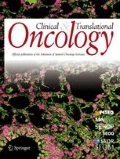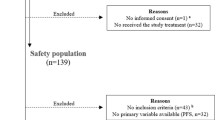Abstract
Introduction
This study aimed to describe the efficacy of fulvestrant 500 mg in postmenopausal women with estrogen receptor (ER)-positive advanced/metastatic breast cancer who had disease progression after receiving anti-estrogen therapy in clinical practice, getting real-world data.
Materials and methods
Multicenter, retrospective, observational study conducted in Spain. Postmenopausal women with locally advanced/metastatic ER-positive breast cancer who received treatment with fulvestrant 500 mg after progression with a previous anti-estrogen therapy were eligible. The primary endpoint was progression-free survival (PFS); secondary endpoints were overall survival (OS), clinical benefit rate (CBR), duration of clinical benefit (DoCB), and safety profile.
Results
A total of 263 women were evaluated (median age, 65.8 years). At a median follow-up of 21.5 months, median PFS and OS were 10.6 and 43.2 months, respectively. PFS according to 1st, 2nd, 3rd, and ≥ 4th lines were 11.5, 10.6, 9.9, and 8.5 months, respectively (p = 0.0245). PFS in patients with visceral involvement was 10 months vs 10.6 months in patients without visceral involvement (p = 0.6604), 9.6 months in patients with high Ki67 vs 10 months in patients with low Ki67 (p = 0.7224), and 10.2 months in HER2+ patients vs 10.3 months in HER2− patients (p = 0.6809). The CBR was 56.5% and the DoCB was 18.4 months. The most frequently adverse events were injection site pain (10.3%) and musculoskeletal disorders (7.6%).
Conclusions
Fulvestrant 500 mg administered in clinical practice was shown to be effective (PFS, 10.6 months; CBR, 56.5%) and well tolerated, in accordance with previous trials.

Similar content being viewed by others
Change history
03 October 2018
A sentence under ‘Results’ heading in the Abstract section was published incorrectly. The correct sentence should read as follows:
References
Torre LA, Bray F, Siegel RL, Ferlay J, Lortet-Tieulent J, Jemal A. Global cancer statistics, 2012. CA Cancer J Clin. 2015;65(2):87–108.
Hashim D, Boffetta P, La Vecchia C, Rota M, Bertuccio P, Malvezzi M, Negri E. The global decrease in cancer mortality: trends and disparities. Ann Oncol. 2016;27(5):926–33.
Dunnwald LK, Rossing MA, Li CI. Hormone receptor status, tumor characteristics, and prognosis: a prospective cohort of breast cancer patients. Breast Cancer Res. 2007;9(1):R6.
Miller WR. Aromatase inhibitors: prediction of response and nature of resistance. Expert Opin Pharmacother. 2010;11(11):1873–87.
Robertson JF. Fulvestrant (Faslodex)—how to make a good drug better. Oncologist. 2007;12(7):774–84.
Howell A, Robertson JF, Quaresma AJ, Aschermannova A, Mauriac L, Kleeberg UR, et al. Fulvestrant, formerly ICI 182,780, is as effective as anastrozole in postmenopausal women with advanced breast cancer progressing after prior endocrine treatment. J Clin Oncol. 2002;20(16):3396–403.
Osborne CK, Pippen J, Jones SE, Parker LM, Ellis M, Come S, et al. Double-blind, randomized trial comparing the efficacy and tolerability of fulvestrant versus anastrozole in postmenopausal women with advanced breast cancer progressing on prior endocrine therapy: results of a North American trial. J Clin Oncol. 2002;20(16):3386–95.
Howell A, Robertson JF, Abram P, Lichinitser MR, Elledge R, Bajetta E, et al. Comparison of fulvestrant versus tamoxifen for the treatment of advanced breast cancer in postmenopausal women previously untreated with endocrine therapy: a multinational, double-blind, randomized trial. J Clin Oncol. 2004;22(9):1605–13.
Di LA, Jerusalem G, Petruzelka L, Torres R, Bondarenko IN, Khasanov R, et al. Results of the CONFIRM phase III trial comparing fulvestrant 250 mg with fulvestrant 500 mg in postmenopausal women with estrogen receptor-positive advanced breast cancer. J Clin Oncol. 2010;28(30):4594–600.
Di LA, Jerusalem G, Petruzelka L, Torres R, Bondarenko IN, Khasanov R, et al. Final overall survival: fulvestrant 500 mg vs 250 mg in the randomized CONFIRM trial. J Natl Cancer Inst. 2014;106(1):djt337.
Summary of Product Characteristics. Faslodex 250 mg solution for injection. 2015. https://www.medicines.org.uk/emc/medicine/14381. Accessed 15 Mar 16.
Robertson JF, Llombart-Cussac A, Rolski J, Feltl D, Dewar J, Macpherson E, et al. Activity of fulvestrant 500 mg versus anastrozole 1 mg as first-line treatment for advanced breast cancer: results from the FIRST study. J Clin Oncol. 2009;27(27):4530–5.
Robertson JF, Lindemann JP, Llombart-Cussac A, Rolski J, Feltl D, Dewar J, et al. Fulvestrant 500 mg versus anastrozole 1 mg for the first-line treatment of advanced breast cancer: follow-up analysis from the randomized ‘FIRST’ study. Breast Cancer Res Treat. 2012;136(2):503–11.
Ellis MJ, Llombart-Cussac A, Feltl D, Dewar JA, Jasiowka M, Hewson N, et al. Fulvestrant 500 mg versus anastrozole 1 mg for the first-line treatment of advanced breast cancer: overall survival analysis from the phase ii first study. J Clin Oncol. 2015;33(32):3781–7.
Migliaccio I, Malorni L, Hart CD, Guarducci C, Di LA. Endocrine therapy considerations in postmenopausal patients with hormone receptor positive, human epidermal growth factor receptor type 2 negative advanced breast cancers. BMC Med. 2015;13:46.
Iorfida M, Maiorano E, Orvieto E, Maisonneuve P, Bottiglieri L, Rotmensz N, et al. Invasive lobular breast cancer: subtypes and outcome. Breast Cancer Res Treat. 2012;133(2):713–23.
Wasif N, Maggard MA, Ko CY, Giuliano AE. Invasive lobular vs. ductal breast cancer: a stage-matched comparison of outcomes. Ann Surg Oncol. 2010;17(7):1862–9.
Adachi Y, Ishiguro J, Kotani H, Hisada T, Ichikawa M, Gondo N, et al. Comparison of clinical outcomes between luminal invasive ductal carcinoma and luminal invasive lobular carcinoma. BMC Cancer. 2016;16(1):248.
Perou CM, Sorlie T, Eisen MB, van de Rijn M, Jeffrey SS, Rees CA, et al. Molecular portraits of human breast tumours. Nature. 2000;406(6797):747–52.
Prat A, Perou CM. Deconstructing the molecular portraits of breast cancer. Mol Oncol. 2011;5(1):5–23.
Anderson WF, Chu KC, Chatterjee N, Brawley O, Brinton LA. Tumor variants by hormone receptor expression in white patients with node-negative breast cancer from the surveillance, epidemiology, and end results database. J Clin Oncol. 2001;19(1):18–27.
Dowsett M, Allred C, Knox J, Quinn E, Salter J, Wale C, et al. Relationship between quantitative estrogen and progesterone receptor expression and human epidermal growth factor receptor 2 (HER-2) status with recurrence in the arimidex, tamoxifen, alone or in combination trial. J Clin Oncol. 2008;26(7):1059–65.
Viale G, Regan MM, Maiorano E, Mastropasqua MG, Dell’Orto P, Rasmussen BB, et al. Prognostic and predictive value of centrally reviewed expression of estrogen and progesterone receptors in a randomized trial comparing letrozole and tamoxifen adjuvant therapy for postmenopausal early breast cancer: BIG 1-98. J Clin Oncol. 2007;25(25):3846–52.
Inic Z, Zegarac M, Inic M, Markovic I, Kozomara Z, Djurisic I, et al. Difference between luminal A and luminal B subtypes according to Ki-67, tumor size, and progesterone receptor negativity providing prognostic information. Clin Med Insights Oncol. 2014;8:107–11.
Untch M, Gerber B, Harbeck N, Jackisch C, Marschner N, Mobus V, et al. 13th st. Gallen international breast cancer conference 2013: primary therapy of early breast cancer evidence, controversies, consensus—opinion of a german team of experts (zurich 2013). Breast Care (Basel). 2013;8(3):221–9.
Johnston S, Pippen J Jr, Pivot X, Lichinitser M, Sadeghi S, Dieras V, et al. Lapatinib combined with letrozole versus letrozole and placebo as first-line therapy for postmenopausal hormone receptor-positive metastatic breast cancer. J Clin Oncol. 2009;27(33):5538–46.
Kaufman B, Mackey JR, Clemens MR, Bapsy PP, Vaid A, Wardley A, et al. Trastuzumab plus anastrozole versus anastrozole alone for the treatment of postmenopausal women with human epidermal growth factor receptor 2-positive, hormone receptor-positive metastatic breast cancer: results from the randomized phase III TAnDEM study. J Clin Oncol. 2009;27(33):5529–37.
Mauriac L, Romieu G, Bines J. Activity of fulvestrant versus exemestane in advanced breast cancer patients with or without visceral metastases: data from the EFECT trial. Breast Cancer Res Treat. 2009;117(1):69–75.
Clarke R, Tyson JJ, Dixon JM. Endocrine resistance in breast cancer–an overview and update. Mol Cell Endocrinol. 2015;418(Pt 3):220–34.
Vergote I, Amant F, Leunen K, Van GT, Berteloot P, Neven P. Metastatic breast cancer: sequencing hormonal therapy and positioning of fulvestrant. Int J Gynecol Cancer. 2006;16(Suppl 2):524–6.
Acknowledgements
We thank the participating patients and their families, all nurses and other members of the staff for their valuable contribution. We also appreciate Ana López-Ballesteros and Antonio Torres-Ruiz (Dynamic Science) for their medical-writing support and editorial assistance.
Author information
Authors and Affiliations
Corresponding author
Ethics declarations
Conflict of interest
JMBC participated as an advisor for AstraZeneca; IB, JSB and MRB (study coordinators) received honoraria from AstraZeneca. None of the other authors has declared any conflict of interest.
Ethical standards
The study was conducted in accordance with the 1964 Declaration of Helsinki and its later amendments. The study was approved by the Independent Research Ethics Committee at Hospital Universitario San Cecilio (Granada, Spain).
Informed consent
Informed consent was obtained from all individual participants before being included in the study.
Funding
The study described within the paper was sponsored by Astra Zeneca Spain S.A., Madrid, Spain.
Rights and permissions
About this article
Cite this article
Blancas, I., Fontanillas, M., Conde, V. et al. Efficacy of fulvestrant in the treatment of postmenopausal women with endocrine-resistant advanced breast cancer in routine clinical practice. Clin Transl Oncol 20, 862–869 (2018). https://doi.org/10.1007/s12094-017-1797-9
Received:
Accepted:
Published:
Issue Date:
DOI: https://doi.org/10.1007/s12094-017-1797-9




